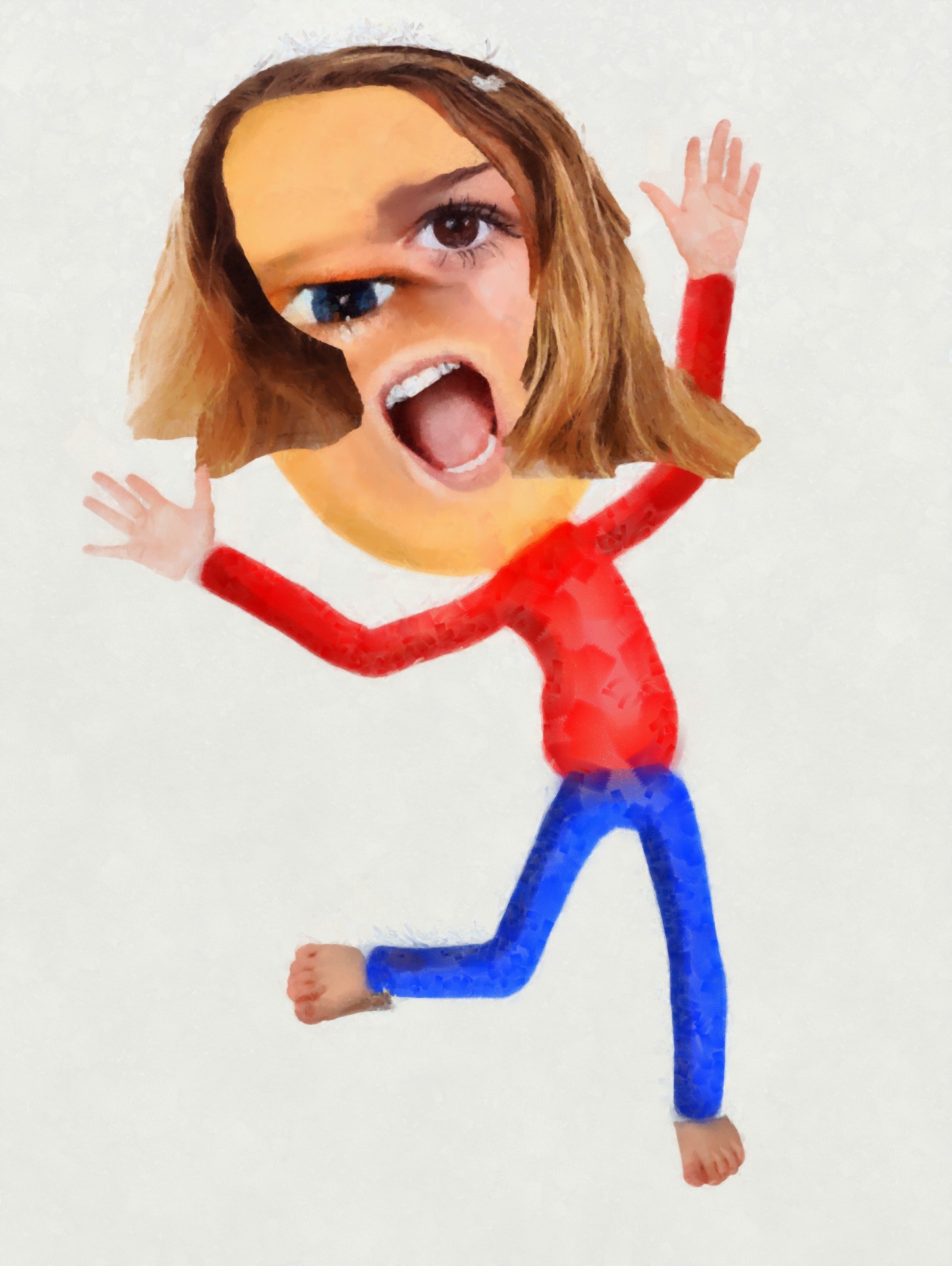Have you ever stumbled upon a phrase that just sticks with you, repeating itself in your mind like a strange, unsettling echo? It's almost as if some words have a peculiar way of burrowing deep into your thoughts. This is certainly the case for the widely known internet saying, "I was crazy once." It’s a series of words that has, in some respects, captivated and puzzled many online for years.
This particular phrase, a kind of digital whisper, tends to resurface time and again across various corners of the internet. You might have seen it pop up in comments, shared on social media, or even heard it in a video. It just has this quality of being both memorable and a bit unsettling, drawing people into its simple, yet rather mysterious, loop.
So, what exactly is the deal with this looping phrase? Why does it keep coming back, and where did it even begin? We are going to look into the story behind "I was crazy once," exploring its origins, its journey through the internet, and what makes it such a persistent piece of online lore. This piece aims to help you understand this intriguing bit of internet history.
Table of Contents
- The Unforgettable Phrase: What is "I Was Crazy Once"?
- Tracing the Roots: The Origin Story
- Why It Sticks: The Psychology of a Loop
- From Usenet to Modern Screens: Its Internet Journey
- More Than Just Words: The Impact and Legacy
- Frequently Asked Questions About "I Was Crazy Once"
The Unforgettable Phrase: What is "I Was Crazy Once"?
The phrase "I was crazy once" is a sequence of words that usually appears as a looping statement. It goes like this: "I was crazy once, they locked me in a room, a rubber room, a rubber room with rats, and rats make me crazy." Then, quite literally, it loops right back to the start, creating an endless cycle of words. This specific structure is what makes it so distinct and, well, kind of unforgettable for many people.
This pattern of words, in a way, paints a picture of someone recounting a strange experience, but the story never really ends. It just circles back on itself, trapping the listener or reader in its repeating narrative. The mention of a "rubber room" and "rats" adds a touch of the unsettling, suggesting a place of confinement and a source of distress, which apparently makes the speaker "crazy."
People often encounter this line in various online spaces, from discussion forums to social media comments. It’s a phrase that, basically, has a life of its own on the internet. The simple, direct language, combined with the looping nature, gives it a unique power to grab attention and, for some, to even feel a bit eerie. It’s a very particular kind of internet artifact, you know, something that just exists and gets passed around.
A Look at the Core Words
To understand the phrase, it helps to look at the word "crazy" itself. The meaning of "crazy" is, as a matter of fact, not mentally sound. It can also describe actions or thoughts that simply lack reason. Someone who is or appears to be mentally deranged might be called crazy. So, the word carries a strong sense of mental instability or foolishness.
When people describe someone or something as crazy, they often think it is very foolish or strange. For instance, people once thought it was crazy to try to make money from manufacturing in certain new ways. The word "crazy" can also define a state or behavior that is highly irrational or unpredictable. It often refers to thoughts, actions, or emotions that deviate from what is commonly expected or considered normal.
The term "crazy," in its comparative form "crazier" and superlative "craziest," refers to someone of unsound mind or someone who is simply insane. It can describe ideas that are both frightening and, well, crazy. This range of meanings for the word "crazy" really adds layers to the looping phrase, making it feel more intense and a bit more unsettling for those who read it.
Tracing the Roots: The Origin Story
The true beginning of the "I was crazy once" pasta is quite specific. It was first used by a Usenet group called alt.support.depression. This happened on January 25, 1996, when an anonymous user posted it there. So, its roots are in a place where people were discussing mental health and support, which is kind of interesting, isn't it?
This original posting on Usenet marks the earliest known appearance of the full looping phrase. Before it became a widely shared internet meme or copypasta, it was a piece of text shared within a specific online community. That it came from an anonymous user also adds to its mysterious quality. We don't really know who first put those words together in that particular order.
The fact that it appeared in a group focused on depression might suggest it was meant to convey a feeling of being trapped or of a mind looping through difficult thoughts. Or, it might have just been a piece of creative writing that resonated with people there. Anyway, its birth on Usenet in the mid-nineties shows it’s an older piece of internet culture than many might think.
The Usenet Connection
Usenet was an early global computer network system. It allowed users to post messages, which were then distributed to other users across the network. It was, you know, a precursor to modern internet forums and social media. The alt.support.depression group was one of many "newsgroups" where people discussed a wide range of topics, including personal experiences and struggles.
The environment of alt.support.depression was a place where people sought help and shared their experiences with mental health issues. The "I was crazy once" text, therefore, found its initial home among individuals who might have understood or related to feelings of being trapped or overwhelmed. It’s quite a poignant starting point for what became a widespread internet phenomenon.
This context is important because it hints at the original tone or intent behind the phrase, even if it was posted anonymously. It wasn't just random words; it was shared in a space where raw, personal expressions were common. This early sharing helped it gain traction, eventually spilling out into the broader internet landscape. It was, basically, a very specific kind of seed planted in a very particular garden.
Why It Sticks: The Psychology of a Loop
The "I was crazy once" phrase has a strange, almost hypnotic effect because of its looping nature. Once you read it, it tends to stick in your head, repeating itself. This repetition can feel a bit unsettling, like a thought you can't quite shake. It taps into something about how our minds sometimes get caught in cycles, you know, going over the same things again and again.
The imagery within the loop—the rubber room, the rats—also plays a part. These are strong, vivid pictures that evoke feelings of confinement, isolation, and a loss of control. A rubber room suggests a place designed to prevent harm, but also to contain. Rats, for many, bring up feelings of disgust or fear, and the idea of them making someone "crazy" adds to the sense of irrationality and distress.
This combination of simple, direct language, vivid but disturbing imagery, and endless repetition makes the phrase incredibly memorable. It’s not just a set of words; it's an experience of reading something that feels like it has no escape. This quality, more or less, is what helps it endure and pop up again and again in online conversations, becoming a kind of inside joke or a shared experience for internet users.
The Power of Repetition
Repetition is a powerful tool in language, and it is very effective here. When a phrase loops, it becomes ingrained in your memory more easily. Think about nursery rhymes or advertising jingles; their repeating patterns make them hard to forget. The "I was crazy once" loop uses this same principle, but for a rather different effect.
The constant return to the beginning of the phrase creates a feeling of being trapped. There is no resolution, no escape from the narrative. The speaker is always "crazy" because of the rats, and the rats are always in the rubber room where they were locked away. This unending cycle can feel a bit maddening, which, ironically, mirrors the theme of the phrase itself.
This kind of linguistic trap can be compelling. It forces the reader to experience a tiny bit of the "craziness" described, simply by getting caught in the loop. This direct, experiential element helps the phrase resonate deeply with people, making it more than just words on a screen. It’s a very clever use of language, actually, to create a specific feeling.
From Usenet to Modern Screens: Its Internet Journey
After its birth on Usenet in 1996, the "I was crazy once" phrase began its journey across the internet. It quickly became what people call a "copypasta." A copypasta is a block of text that gets copied and pasted repeatedly across online forums and social media. This particular phrase was, you know, a perfect fit for this kind of spread due to its short, memorable, and self-contained nature.
People remember this from back in like the early 2000s as a cringy copypasta. It often appeared in unexpected places, sometimes as a joke, sometimes as a way to annoy others, and sometimes just because it was a well-known piece of internet lore. Its presence in various online communities helped solidify its status as a widely recognized piece of internet culture, even if it was seen as a bit "cringy" by some.
The phrase has experienced what people call a "sudden resurgence" at different times. This means that even after years of less frequent appearances, it will suddenly become popular again. This pattern of fading and then reappearing is common for many internet memes and copypastas. It suggests that, basically, there's something timeless about its strange appeal, allowing it to connect with new generations of internet users.
A Digital Echo
The way "I was crazy once" spreads is like a digital echo. Someone posts it, then someone else copies it, and then someone else pastes it somewhere new. This process allows it to travel far and wide, reaching different websites, forums, and social media platforms. It's a very simple yet effective way for content to go viral, even before the term "viral" was commonly used.
The phrase's adaptability also helps it spread. It can be used in many contexts, from a simple reply to a comment, to a standalone post, or even as part of a larger joke. Its short length means it's easy to share, and its distinctiveness makes it instantly recognizable. This ease of sharing is a key factor in its continued presence online.
Even today, you might see discussions about what is up with the sudden resurgence of the whole "crazy, I was crazy once" thing. This ongoing curiosity shows that the phrase continues to capture people's attention, prompting questions about its meaning and origin. It's a testament to how certain pieces of internet text, however simple, can really endure over time and continue to spark conversation.
More Than Just Words: The Impact and Legacy
The "I was crazy once" copypasta is more than just a string of words; it's a piece of internet history that has left its mark. It represents an early form of viral content, showing how simple, memorable phrases could spread across nascent online communities. Its journey from a Usenet group to widespread recognition highlights the organic way internet culture often develops, you know, without any central planning.
For many, the phrase holds a certain nostalgic value, reminding them of earlier days of the internet when such quirky, often nonsensical, content was a common sight. It’s a relic of a time when online spaces felt a bit more raw and experimental. This connection to the past gives it a special place in the hearts of those who remember its initial spread, basically, as a part of their own digital coming-of-age.
The enduring appeal of "I was crazy once" also points to something about human nature—our fascination with the absurd, the unsettling, and the things that defy easy explanation. The loop, the rubber room, the rats, the "craziness"—all these elements combine to create a miniature narrative that is both disturbing and, in a strange way, compelling. It continues to prompt questions, like "What is the origin of crazy, I was crazy once, they locked me in a room, a rubber room, a rubber room full of rats?"
This phrase stands as a unique example of how a few simple lines can achieve lasting fame in the digital world. It is, very truly, a part of the internet's folklore. It reminds us that even the most peculiar pieces of text can find a permanent home in the collective memory of online communities. To learn more about internet culture and its evolution, you can explore other content on our site. Also, for a deeper look into how online phrases gain traction, link to this page understanding viral content.
If you've ever found yourself caught in the loop of "I was crazy once," you are certainly not alone. It's a shared experience for countless internet users. It's a little piece of digital history that keeps on giving, sometimes as a joke, sometimes as a memory, and sometimes just as a strange, looping thought. It’s a very interesting phenomenon, isn't it? For more insights into online trends, you might want to check out resources like Google Trends, which can show you how popular phrases ebb and flow over time.
Frequently Asked Questions About "I Was Crazy Once"
Here are some common questions people ask about the "I was crazy once" phrase:
What is the origin of "I was crazy once"?
The phrase "I was crazy once, they locked me in a room, a rubber room, a rubber room with rats, and rats make me crazy" originated on January 25, 1996. It was posted by an anonymous user on a Usenet group called alt.support.depression. This makes it an early piece of internet copypasta.
What does the "rubber room with rats" mean in the copypasta?
The "rubber room" typically refers to a padded cell, a place for containing individuals deemed mentally unstable or dangerous. The "rats" are then introduced as a source of extreme distress or fear, which, in the context of the phrase, is said to be what makes the speaker "crazy." It creates a vivid, unsettling image of confinement and psychological torment, contributing to the phrase's looping, inescapable feeling.
Why did "I was crazy once" become a popular internet meme?
It became popular due to its simple, memorable, and endlessly looping structure. The phrase is short, easy to copy and paste, and has a distinct, unsettling quality that captures attention. Its somewhat nonsensical but repetitive nature makes it both humorous and a bit eerie, allowing it to resonate with a wide audience and experience periodic "resurgences" in online communities.



Detail Author:
- Name : Chadd Durgan
- Username : stokes.anderson
- Email : jazmyn58@yahoo.com
- Birthdate : 2005-10-13
- Address : 41719 Arely Drive Apt. 158 Dashawnville, NE 49944
- Phone : 1-463-537-4338
- Company : Jacobi-Ward
- Job : Economist
- Bio : Ad repudiandae corporis qui officiis. Provident voluptatem rerum veritatis repudiandae aliquam. Veritatis consequatur possimus voluptate necessitatibus voluptates nemo soluta quisquam.
Socials
linkedin:
- url : https://linkedin.com/in/harvey_kilback
- username : harvey_kilback
- bio : Rerum et quis dolorum molestiae.
- followers : 3754
- following : 28
twitter:
- url : https://twitter.com/harvey_official
- username : harvey_official
- bio : Aut autem rerum cum molestiae est repellat. Nihil vel molestiae quo magni nobis est. Quisquam aut ipsum veniam eius.
- followers : 1256
- following : 1627



























